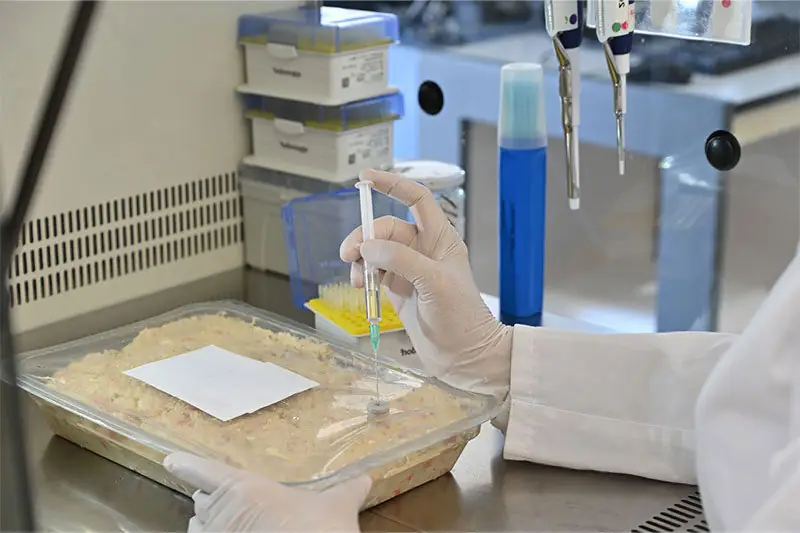Water Quality Microbiological Testing for Cosmetic Manufacturing
The quality of water is a critical aspect in cosmetic manufacturing. Waterborne microorganisms, if not properly controlled, can lead to contamination issues that compromise the safety and efficacy of cosmetics. This section delves into the nuances of microbiological testing specifically designed for assessing water quality in cosmetic production processes.
Water used in cosmetic manufacturing must meet stringent standards set by regulatory bodies such as the FDA (Food and Drug Administration) and ISO 22716:2019, the international standard for personal care products. Compliance with these regulations is essential to ensure that the final product is safe for consumers.
The testing process involves several steps aimed at identifying potential contaminants in water. These include:
- Sampling: Water samples are collected from various points within the facility, including raw water sources, treated water tanks, and distribution systems.
- Preservation: Samples are preserved using appropriate methods to prevent microbial growth during transit to the laboratory.
- Analysis: The samples undergo a series of microbiological analyses which include:
1. Total Plate Count (TPC): This determines the number of viable heterotrophic bacteria present in the water sample. A low count indicates better water quality and compliance with FDA standards for cosmetic manufacturing.
2. Fecal Indicator Bacteria: Detection of fecal coliforms or E. coli is crucial as their presence suggests contamination from human waste, which could lead to serious health risks.
3. Coliform Bacteria Testing: This test ensures that no pathogenic bacteria are present in the water supply used for manufacturing cosmetics.
4. Yeast and Mold Count: Ensuring that the water is free of yeast and mold colonies helps prevent product spoilage and maintains the integrity of the cosmetic formulation.
5. Aeromonas Testing: This test checks for the presence of Aeromonas bacteria, which can cause skin irritation or infections if present in cosmetics.
The use of advanced microbiological techniques such as PCR (Polymerase Chain Reaction) and ELISA (Enzyme-Linked Immunosorbent Assay) further enhances the accuracy and reliability of these tests. These methods allow for rapid detection and quantification of specific pathogens, ensuring that water quality meets regulatory requirements.
Once the samples have been analyzed, detailed reports are generated which include all test results along with recommendations for corrective actions if any issues are identified. Compliance officers and R&D engineers rely on these reports to make informed decisions regarding water treatment processes and ensure product safety.
Why Choose This Test
Selecting the right microbiological testing service is crucial for maintaining high standards in cosmetic manufacturing. The test ensures that all water used in the production process meets stringent regulatory requirements, thereby protecting consumer health and ensuring product quality.
The benefits of this test extend beyond mere compliance. It provides peace of mind by offering assurance that every batch produced adheres to international standards such as ISO 22716:2019. This standard emphasizes the importance of microbiological testing in safeguarding public health, and choosing a reliable service provider ensures alignment with these guidelines.
Moreover, regular testing helps identify potential risks early on, allowing for timely corrective actions to be implemented. This proactive approach not only minimizes the risk of contamination but also enhances brand reputation by demonstrating commitment to safety and quality.
R&D engineers benefit from this service as it provides insights into water quality trends over time, facilitating improvements in water treatment processes. Compliance officers gain valuable data for audits and inspections, ensuring continuous adherence to regulatory expectations.
For procurement teams, selecting a reputable laboratory ensures consistent supply of high-quality raw materials, including water used in manufacturing. This reliability contributes significantly towards maintaining product consistency across batches and locations.
Customer Impact and Satisfaction
Implementing robust microbiological testing protocols for water quality in cosmetic manufacturing has a direct impact on customer satisfaction. By ensuring that every batch produced meets the highest standards of safety and efficacy, manufacturers can build trust with their customers.
Consumers are increasingly concerned about product safety and transparency in sourcing materials. Companies that invest in thorough testing demonstrate their commitment to these values, leading to higher customer loyalty and repeat purchases.
A satisfied customer base translates into positive reviews and recommendations, which is crucial for brand growth and market expansion. It also helps in building a strong reputation within the industry, making it easier to attract new clients and partners.
Moreover, adherence to regulatory standards not only enhances consumer trust but also protects the company from legal actions or recalls due to non-compliance. This reduces potential financial losses and reputational damage associated with such incidents.
In summary, implementing microbiological testing for water quality in cosmetic manufacturing is essential for maintaining high standards of safety and efficacy. It ensures customer satisfaction while fostering a positive reputation and building long-term relationships within the industry.
Competitive Advantage and Market Impact
The implementation of comprehensive microbiological testing for water quality provides significant competitive advantages in the cosmetic manufacturing sector. In an increasingly competitive market, businesses that prioritize product safety are better positioned to attract and retain customers.
By ensuring that all raw materials used in production meet strict regulatory requirements, companies can differentiate themselves from competitors who may not adhere to such stringent standards. This commitment to quality helps establish a strong brand identity and enhances customer trust.
Maintaining consistent product quality across batches and locations is crucial for maintaining market share. Regular microbiological testing ensures that any deviations in water quality are identified early, allowing manufacturers to take corrective actions promptly. This proactive approach not only maintains product consistency but also prevents disruptions in production schedules due to contamination issues.
Compliance with international standards such as ISO 22716:2019 positions companies favorably in terms of regulatory compliance and market access. Many countries have specific requirements for cosmetic manufacturers, and adherence to these standards facilitates easier entry into new markets or regions.
The ability to demonstrate a commitment to safety and quality through rigorous testing can open up opportunities for collaboration with international partners and suppliers who also prioritize high standards. This collaborative approach fosters innovation and drives market growth within the industry.





